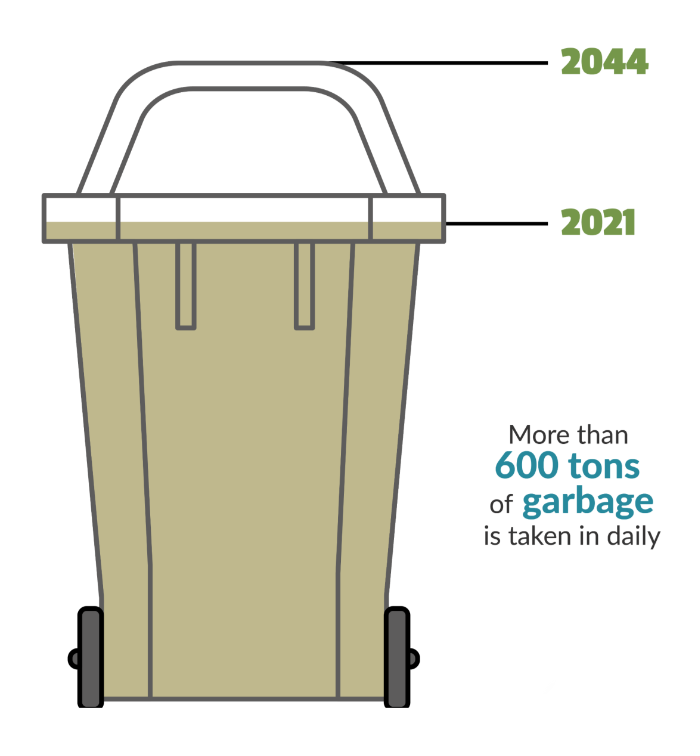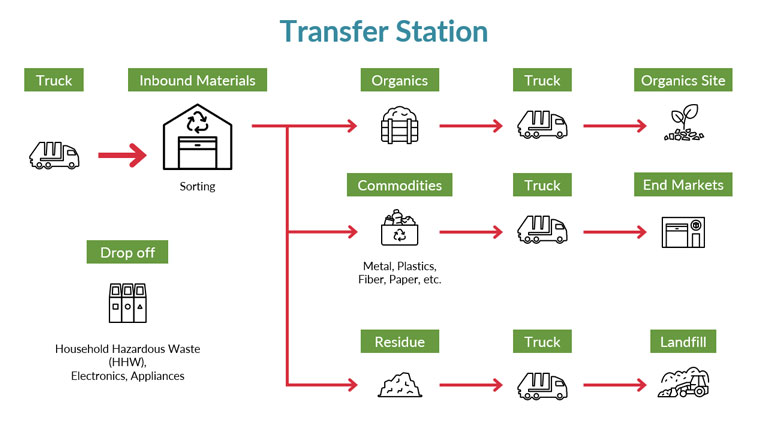Forward 2044
Waste & Recycling Planning for Linn County's Future

Charting Linn County's Waste Future
The Cedar Rapids Linn County Solid Waste Agency, formed in 1994 to oversee solid waste management for the county until June 30, 2044, now faces a pressing challenge: the main landfill site in Marion is filling up at a faster rate than expected, and could close as soon as 2036.
 That will mean tough choices for the community and higher costs for the waste disposal services we all rely on, which handle 600 tons of garbage daily.
That will mean tough choices for the community and higher costs for the waste disposal services we all rely on, which handle 600 tons of garbage daily.
This challenge has spurred a new study and planning effort, called Forward 2044. It will ultimately decide the future of solid waste management in Linn County.
This page is a resource for that project, including public documentation, presentations and other assets related to the agency's work.
It is also a call to action: Every resident and business must do their part if we are to preserve this important local service as long as possible.
To learn more about Forward 2044 and other projects we are working on, join our mailing list.
What is Forward 2044?
The Solid Waste Agency's board of directors is currently undertaking the Forward 2044 study to build a plan for the future of Linn County's solid waste management.
So far, the board has made decisions to ensure the health, safety, and welfare of Linn County through cost-effective, environmentally sound practices for the management of solid waste generated in the county. These decisions, as well as future ones, have been guided by feedback received from board meetings, presentations to stakeholders, and a public meeting.
The board has made three key decisions so far:
- Continuing the Agency past 2044. This includes continuing to offer waste disposal management, recycling services, and household hazardous waste collections for Linn County residents.
- No new landfill will be created in Linn County.
- The Agency will look to build a regional organics management facility in Linn County. A regional solution to manage food waste, yard waste and brush is more cost-effective, and larger volumes allow for additional technologies to be employed. Also, this will help Linn County be prepared to handle large volumes of organics in the case of a future natural disaster.
To help the public better understand the Forward 2044 planning process, the Agency has created a Vision Map. This document provides a high-level look at the decisions the board will make as they move toward their goal of continuing to efficiently manage waste within Linn County.
Planning for Beyond 2044
This planning process is an opportunity for our community to establish a successful, sustainable, and safe future for its solid waste management needs. The Agency originally considered eight scenarios for beyond 2044. Those have been narrowed down through the selection process, using factors such as proven work history, cost, and environmental sustainability.
The board of directors has decided not to pursue siting a new landfill in Linn County. A variety of factors went into this decision, including a lack of available land due to zoning restrictions. That’s not to say a landfill won’t be part of the future waste management solution the board ultimately selects. There could be a new regional landfill developed in tandem with public or private partners – it just wouldn’t be located in Linn County.
The board is still considering scenarios that could include transfer stations or alternative technologies, such as:
- Thermal technologies (Direct combustion, gasification, plasma arc gasification, pyrolysis)
- Biological technologies (Aerobic composting, anaerobic digestion, mechanical biological treatment)
- Chemical technologies (Hydrolysis, catalytic and thermal depolymerization)
- Mechanical technologies (Autoclave/steam classification, mixed waste processing, refuse-derived fuel (RDF) production)
Any alternative technology would have to be environmentally safe, economically sound, and proven to work with a waste stream similar to what is generated in Linn County.
Learn more about these options below, or download this technical memorandum from the Solid Waste Agency.
Diversion Remains the Best Solution
As the existing landfill's capacity for waste continues to decline, reducing the amount of materials in the landfill is a high priority for the Agency. This diversion can take on many forms, including:
- increased recycling
- composting food waste
- proper disposal of household hazardous waste
- removing mattresses and furniture from the waste stream
- transferring waste to other landfills
- rejecting inbound waste at the landfill
Each ton of materials diverted at the source will save room in the landfill, extending its working life. Waste diversion requires items to be separated from the collection point, which means consumers play an important role in this work.
To learn how you can do your part in diverting waste, see the following educational resources from the Solid Waste Agency:
Landfilling is Still Needed
In the Midwest, landfilling is largely found to be an economically favorable waste management practice. At some level, landfilling will continue to play a role in the holistic waste management process.
Alternative technologies can drastically reduce the amount of waste materials needed to be landfilled. However, residues and by-products of alternative waste technologies must still be managed.
Landfilling can be accomplished via local or regional means. The board has decided not to site a new landfill within Linn County. A new landfill could be sited with public or private partners to serve many communities, but it would be located elsewhere. This process follows various federal, state, and local procedures and policies. Many different factors are considered when determining where to site a new landfill, including cost, location and environmental impact.
Waste Transfer Stations
Waste transfer stations are a point between a community’s solid waste collection program and a final solid waste disposal facility. After solid waste is collected from residences and/or businesses, it is taken to a transfer station, where the waste is compressed and grouped together for economical transport to a final facility elsewhere.
While it would not require a new landfill to be constructed, a waste transfer station approach would add additional costs in the collection and transportation of waste to its final destination. Presently, waste is taken to the landfill, and a tipping fee is paid for disposal. With a transfer station, there are additional costs for taking garbage to a transfer station facility, loading it onto trucks, and driven to a landfill, on top of the tipping fee.

Other Resources & Frequently Asked Questions
Links to presentations about Forward 2044 are posted here:
- Summary of Waste Volumes and Projections
- Goals & Objectives with Infrastructure Options Analysis Criteria
- Infrastructure Options: Refinement of Options for Detailed Analysis
- Forward 2044 Community Presentation
- Forward 2044 Community Presentation Video
- Long-Term Waste Management System Evaluation Report (Forward 2044)
- Forward 2044 Phase 1 Overview & Update
- Solid Waste Agency Waste Characterization 2022 Summary
Board Meetings - Presentations
- 6/15/2021; 28E Review & Agency Role
- 8/17/2021 Forward 2044 Goals, Objectives, and Guiding Criteria
- 12/21/2021 Infrastructure Analysis & Cost(Scenarios 1 through 5)
- 1/18/2022 Infrastructure Analysis - Stakeholder Meeting Findings
- 3/15/2022 Infrastructure Analysis and Costing Update: Sustainable Return on Investment
- 5/17/2022 Preliminary Location Assessment
- 7/19/2022 Forward 2044 Board Workshop Goals
- 1/17/2023 Forward 2044 WASTECON Site Visits Recap
- 3/21/2023 Forward 2044 Board Workshop
- 3/21/2023 Forward 2044 Executive Summary of TM 2022 Food Waste Digester Feasibility Study
Frequently asked questions (FAQs) about Forward 2044
Questions & Comments
Have questions about Forward 2044? Comments? Let us know what you think. Send an email via our Contact Us page.
To learn more about Forward 2044 and how you can take action today, join our mailing list.